Updated May 24
5/21 – NAHJ Town Hall from NAHJ Admin on Vimeo.
Dissenters Were Called ‘Crabs in a Barrel’
Lack of Diversity Reflected in COVID Reporting
Trump Calls 3 Black Journalists ‘Dumb’
Objection to Phrase ‘Unarmed Black Man’
Producers Made Madam Walker Story Cringeworthy
Rana Cash Named Editor of Savannah Morning News
Michael Carr Promoted to GM in Fresno
Passings: Roger B. Brown, Cheryl G. Butler, Albert Dickens, Martin McNeal
Short Takes
Home page photo: Nick Valencia is surrounded by other members of the National Association of Hispanic Journalists at last year’s Excellence in Journalism convention in San Antonio. (Credit: Warner Media)
[btnsx id=”5768″]
Dissenters Were Called ‘Crabs in a Barrel’
What some called a stunning, disrespectful performance by Nick Valencia, an Atlanta-based CNN reporter who is vice president/broadcast of the National Association of Hispanic Journalists, was followed Friday by a public apology to members from NAHJ President Hugo Balta (pictured below).
The apology came after a “town hall” meeting via Zoom Thursday over the NAHJ board’s decision to cancel this year’s elections because of the uncertainty caused by the COVID-19 pandemic.
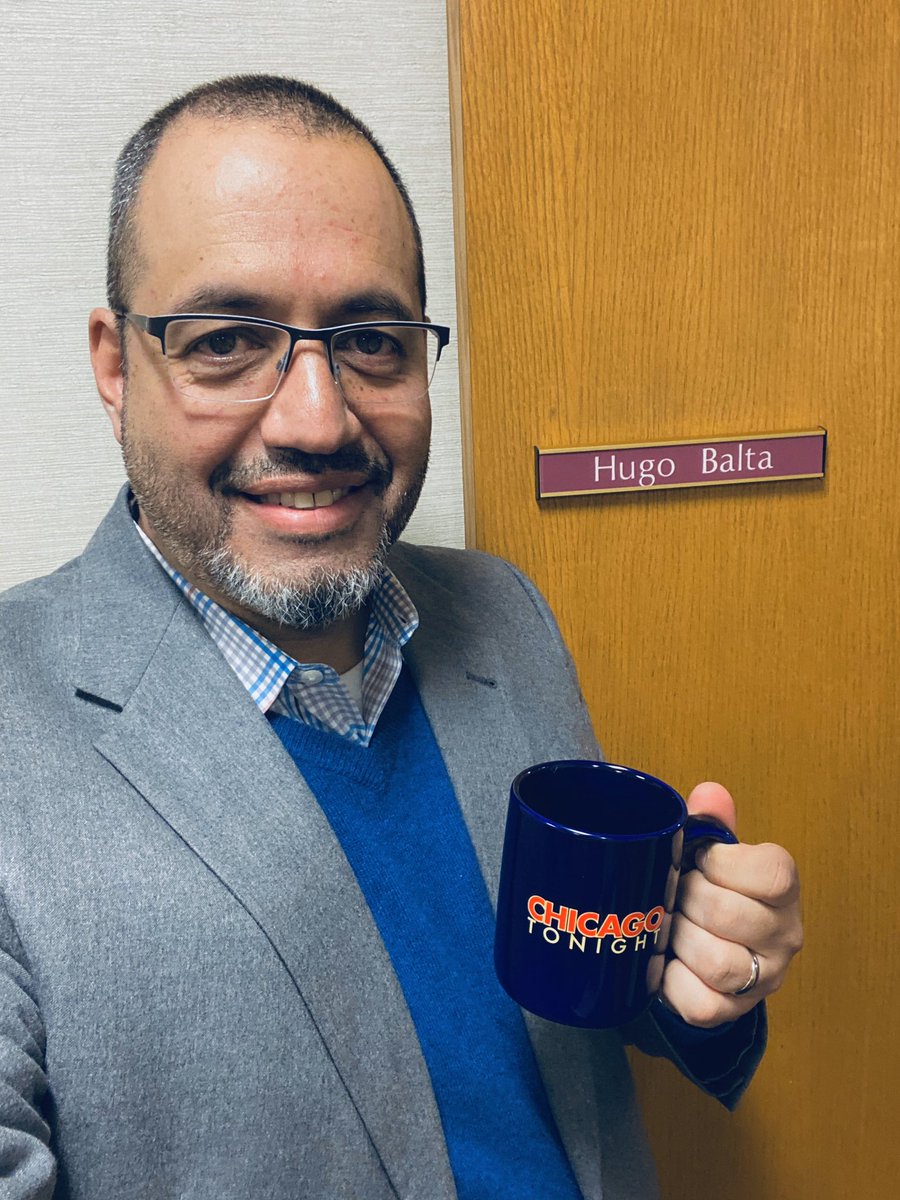 In several comments throughout the hour-long meeting, Valencia called the dissenters, who dominated the session and included some of the most prominent and senior members of the organization, “crabs in a barrel” who “have a lot of time on their hands.”
In several comments throughout the hour-long meeting, Valencia called the dissenters, who dominated the session and included some of the most prominent and senior members of the organization, “crabs in a barrel” who “have a lot of time on their hands.”
Balta said in a statement Friday, “On behalf of the board, I apologize for an unwarranted reaction against members who attended the town hall to engage in civil discourse. The willingness to engage should never be met with any level of disrespect.”
However, while an association president publicly criticizing a vice president is rare, some felt that Balta’s response should have come during the meeting.
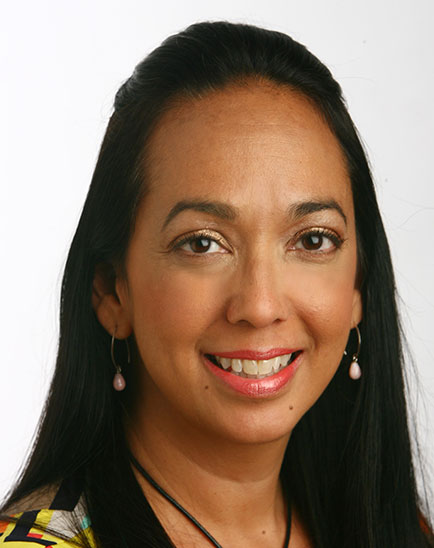 Frances Robles of the New York Times (pictured), the first target of Valencia’s ire during the meeting, messaged Journal-isms afterward, “I felt like I was at a Trump press conference, watching a woman of color being attacked for asking a neutral and journalistically sound question.
Frances Robles of the New York Times (pictured), the first target of Valencia’s ire during the meeting, messaged Journal-isms afterward, “I felt like I was at a Trump press conference, watching a woman of color being attacked for asking a neutral and journalistically sound question.
“I am pleased to see acknowledged that the treatment that nearly 100 longtime active members of NAHJ endured was improper, but, more importantly, what was also improper was the decision of the NAHJ board to keep themselves in office under dubious grounds. We are only looking for NAHJ to follow its own bylaws.”
Citing the “unpredictability” caused by the COVID-19 pandemic, the organization announced April 16, “After much consideration, the board voted to temporarily limit any unnecessary radical change in the interest of preserving a strong and effective organizational foundation.”
The board announced May 5 that it had reiterated its decision to postpone the NAHJ election, responding to critics who produced a letter from an attorney who concluded, “my legal opinion is that the NAHJ’s leadership’s decision to suspend elections and award themselves an additional year of office is illegal and ill-advised.”
The board also announced then that it would hold a “virtual town hall,” which took place Thursday.
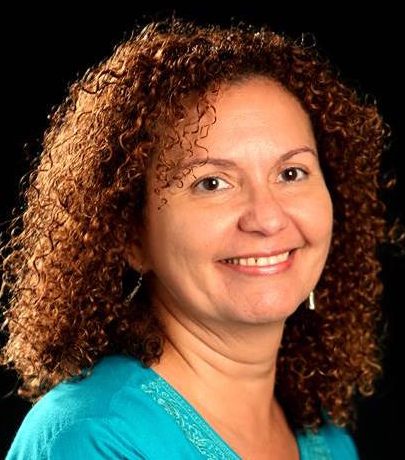 With notable differences in tone, the board’s top officers explained their decision, saying that the planned joint convention with the National Association of Black Journalists in Washington had been in jeopardy because of the pandemic and that at the time, the associations were in negotiations with the host hotel. “We were facing a potential loss of over a million dollars,” said Nancy San Martin, vice president/print (pictured).
With notable differences in tone, the board’s top officers explained their decision, saying that the planned joint convention with the National Association of Black Journalists in Washington had been in jeopardy because of the pandemic and that at the time, the associations were in negotiations with the host hotel. “We were facing a potential loss of over a million dollars,” said Nancy San Martin, vice president/print (pictured).
The election was to take place in person at the convention as well as electronically.
The two groups announced on April 24 that the convention would be held virtually.
An all-electronic election “would have taken the limited staff that we have away from the current focus, once we were able to initiate the virtual conference. In order to have a virtual election we would have to put [measures] in place to ensure that we were up to snuff. We’re not at that level yet,” said San Martin.
Balta told the group, “We sought the counsel, and after seeking . . . counsel, counsel advised us that we did not commit an illegal act.” That assurance was made by telephone, he said, so there is no written opinion to share with members.
He responded to criticism that the membership was not consulted by saying, “I take full responsibility for anything that has to do with communication. That’s on me. And I recognize that this conversation that we’re having should have been had a long time ago. That criticism is warranted.
“That said, this board made a decision under a situation that’s unprecedented, and in the best interests of the organization. And as I said in the beginning, there are many different paths to get to the same destination. I’ve been on both sides of this situation, giving constructive criticism and championing it.”
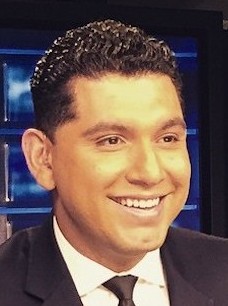 Valencia (pictured) dismissed talk of illegality. He asked, “Where is this type of energy during the conference when we vote? Our voting turnout is historically low. Dozens, sometimes, of people vote, 70 votes sometimes is the total for people. We have more people on this Zoom call than we do voting at our convention.
Valencia (pictured) dismissed talk of illegality. He asked, “Where is this type of energy during the conference when we vote? Our voting turnout is historically low. Dozens, sometimes, of people vote, 70 votes sometimes is the total for people. We have more people on this Zoom call than we do voting at our convention.
“And I ask those who are especially vocal on social media where that energy is and what you’ve done to serve this organization? What you’ve done to help journalists? You know, look to your left and look to your right, in the newsrooms that we’ve worked with. That’s why we’re all here; I know that’s why I’m here. I’m not trying to get into a pissing match with anybody about legalities.”
Signatories to the initial letter questioning the legality of the board’s postponement originally included 45 members; 31 in the “lifetime” category, 12 Hall of Fame inductees, 11 former board members, seven former presidents, two founders and 11 other members, including student project leaders. Some had more than one distinction; other names were added later.
Valencia also said, “If there’s anyone here who wants to improve our organization and not just complain, not just come and talk to us about legalities? I mean, c’mon. Really? It’s just so upsetting for me. As a member of this organization, I don’t mind being questioned. I don’t mind that people are upset. But I think it’s so disingenuous to compare what we’re doing to [the actions of] dictatorships or governments in South America or communist regimes. That’s ridiculous.
“That is so beyond what is happening right now, and to make those parallels, it points to why you guys are complaining in the first place, and again, I know there’s a lot of people on here, but it seems to be a very small core group of people that have a problem with it and it seems to be a personal thing.”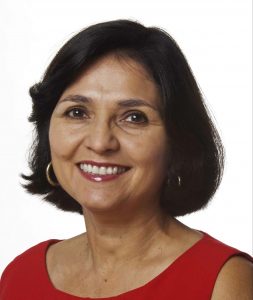 Maggie Rivas-Rodriguez (pictured), a journalism professor at the University of Texas at Austin and a co-founder of the organization, created in 1984, responded, “Nick, I take great exception to what you said. Because, even though you only have 70 people voting in the elections, obviously there’s a lot of people who support NAHJ, and have given a lot of their lives and a lot of their energy to get NAHJ off the ground, to begin with, and to get it to where it is today.
Maggie Rivas-Rodriguez (pictured), a journalism professor at the University of Texas at Austin and a co-founder of the organization, created in 1984, responded, “Nick, I take great exception to what you said. Because, even though you only have 70 people voting in the elections, obviously there’s a lot of people who support NAHJ, and have given a lot of their lives and a lot of their energy to get NAHJ off the ground, to begin with, and to get it to where it is today.
“So, there’s like generations of NAHJ. Just so you know, just because you don’t see them doesn’t mean they’re not people. There are people on this call tonight that also are supporting NAHJ. So my question is, if this decision could be made, it can also be rescinded. . . . and it doesn’t really have to coincide any longer with the convention, right? . . .
“In a way this has been an important moment for NAHJ, because what I think has happened is that people have been shaken out of their complacency,” Rivas-Rodriquez continued. “And it’s shown that people that maybe don’t even go to the conventions, they still believe in the mission of NAHJ and they still support it and want to see it move forward . . . There’s no reason not to rescind it now that you’ve seen how upset people are, and they are very upset about this.”
Valencia replied, “I understand that people are very upset about this. I also understand that like when I ran, I was the only candidate that ran opposed. I don’t understand. Everyone can run. Everyone has an opportunity to step up and lead. We’re always looking for people to lead committees, to lead task forces, to come up with ideas, and it seems as though, in my 10 years in the organization, the only time people want to get vocal is to complain and to tear each other down.”
No one who spoke was changing his or her position.
Valencia maintained, “It is a small minority of our members that are being vocal. A minority that has a lot of time on their hands.”
 Veronica Villafañe (pictured), a former NAHJ president and board member who writes the “Media Moves” online column, among other activities, broke in. “Hold it right there, Nick. I don’t have a lot of time on my hands. . . . That’s a very condescending attitude to take.”
Veronica Villafañe (pictured), a former NAHJ president and board member who writes the “Media Moves” online column, among other activities, broke in. “Hold it right there, Nick. I don’t have a lot of time on my hands. . . . That’s a very condescending attitude to take.”
Balta then interrupted, “Let me talk again.”
He said later in the exchange, “We didn’t throw our hat in the ring to be popular. We threw our hat in the ring like many people on this call because of our passion for this organization and the need for journalists, particularly Latino journalists.” Although Balta began by calling the dissenters “a small minority,” near the end of the call he said, “The fact that we took a path that is unpopular, that’s understandable.”
Balta concluded in Friday’s prepared statement, “Unity and collaboration are the hallmarks of any strong organization. There is a place for everyone to work together to create change through NAHJ.”
At meeting’s end, San Martin, managing editor at El Nuevo Herald, told the group, “This is the best turnout of the membership that I’ve seen in a long time and I welcome it.”
Asked Friday what he had to say in retrospect, an irritated Valencia would say on the record only that he had no comment.
 Rafael Olmeda (pictured), a past NAHJ president who has helped lead the critics, said, “The Town Hall demonstrated clearly that the current board couldn’t even handle its members, much less the crisis NAHJ faces.”
Rafael Olmeda (pictured), a past NAHJ president who has helped lead the critics, said, “The Town Hall demonstrated clearly that the current board couldn’t even handle its members, much less the crisis NAHJ faces.”
Speaking for the dissenters, Olmeda said, “We are reviewing our options and the appropriate timing of taking any future action to assure the rights of all members are protected.”
- National Association of Hispanic Journalists: NAHJ Hall of Fame Inductee, Aminda Marqués González, to Take Another Stride in Leadership as First Hispanic Co-Chair on the Pulitzer Prize Board
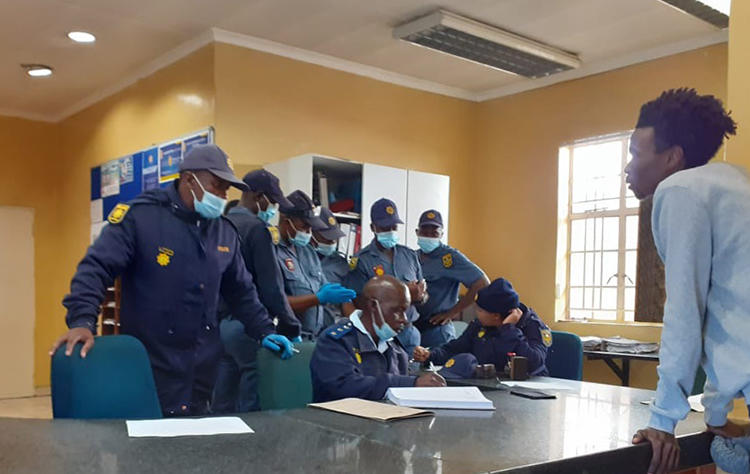
Lack of Diversity Reflected in COVID Reporting
“Like many businesses, newsrooms have been forced to cut back their staffs during the coronavirus pandemic, shrinking the number of journalists of color covering the crisis,” Marian Liu wrote Thursday for the Washington Post. “Many worry that, as the coronavirus spreads disproportionately across the country, hitting communities of color the hardest, the lack of diversity in journalism’s ranks is reflected in news reporting.
“In the early days of the outbreak, for example, news organizations published generic photos of Chinatown neighborhoods and masked Asian people with stories about the coronavirus pandemic, which critics said fueled xenophobic ideas about who carried the disease.
“ ‘How can the industry adequately report on communities in a fair manner, while combating implicit bias, when the majority of our reporters don’t come from these communities and don’t understand the complex and nuanced behaviors and issues stemming from these communities?’ said Tauhid Chappell, a board member with the Philadelphia Association of Black Journalists. . . .”
- Matt Barreto and Gary Segura, Latino Decisions: NEW POLL: 1 in 4 US Latinos Know Somebody Infected by COVID-19
- Charles M. Blow, New York Times: States Keep Failing Black People
- Committee to Protect Journalists: South African police assault, charge journalist Paul Nthoba after he photographs COVID-19 lockdown
- Amanda Darrach, Columbia Journalism Review: Indian Country: Behind the monolith (podcast) (May 15)
- Elvia Díaz, Arizona Republic: Most Americans don’t want undocumented immigrants to get COVID-19 financial help. Politicians are happy to oblige
- Editorial, Miami Herald: Miami, state evict homeless amid COVID-19 pandemic. What were they thinking?! (May 14, updated May 17)
- John Eligon and Audra D. S. Burch, New York Times: Questions of Bias in Covid-19 Treatment Add to the Mourning for Black Families (May 10, updated May 20)
- Robert Gebeloff, Danielle Ivory, Matt Richtel, Mitch Smith and Karen Yourish of The New York Times; Scott Dance of The Baltimore Sun; Jackie Fortiér and Elly Yu of KPCC/LAist; and Molly Parker of The Southern Illinoisan: The Striking Racial Divide in How Covid-19 Has Hit Nursing Homes
- Dahleen Glanton, Chicago Tribune: If Donald Trump’s followers want to take hydroxychloroquine, who are we to stop them?
- Kristen Hare, Poynter Institute: The coronavirus has closed more than 30 local newsrooms across America. And counting.
- Euny Hong, New York Times: Why I’ve Stopped Telling People I’m Not Chinese (May 15)
- Aaron Horowitz, Arizona Republic: Reducing prison population during pandemic is a matter of public health, not politics
- EJ Montini, Arizona Republic: Will Navajo people, ravaged by COVID-19, also be disenfranchised?
- The Nib and Reveal, Center for Investigative Reporting: In/Vulnerable: Inequity in the Time of Pandemic
- Andrés Oppenheimer, Miami Herald: If Trump wants to ban travel to prevent COVID-19, why does he target Latin America and not Europe?
- Clarence Page, Chicago Tribune: With hydroxychloroquine statement, President Trump distracts from real health care issues
- Joe Penney, the Intercept: Racism, Rather Than Facts, Drove U.S. coronavirus travel bans (May 16)
- Leonard Pitts Jr., Miami Herald: Angry white men refuse to be governed like the rest of us (May 12)
- Carrie Reynolds and Ebony Reed, Medium.com: Connecting With Readers During a Crisis
- Simon Romero and Jack Healy, New York Times: Tribal Nations Face Most Severe Crisis in Decades as the Coronavirus Closes Casinos (May 11, updated May 13)
- Barry Saunders, the Saunders Report: Despite the Rona, they’re gonna buy those shoes, get those hairdos. (May 7)
- Frank Shyong, Los Angeles Times: Filipino nurses battled discrimination to work in American hospitals. Now they fight for PPE
- Michael Tisserand, Daily Beast: How ‘Curtis’ Tackled the Coronavirus in a Newspaper Comic
- Grace Vitaglione, Current.org: Battling lack of resources, Native stations provide lifeline with COVID coverage
The president has called three prominent black journalists dumb in the last month alone. pic.twitter.com/XXUTeRL6XS
— Daniel Dale (@ddale8) May 22, 2020
Trump Calls 3 Black Journalists ‘Dumb’
As Donald Trump’s reelection campaign plans a $1 million digital ad blitz aimed at capitalizing on Joe Biden’s “Breakfast Club” remark that African American voters “ain’t black” if they’re considering voting for the president, CNN’s Trump-fact-checking reporter Daniel Dale notes, “The president has called three prominent black journalists dumb in the last month alone.”
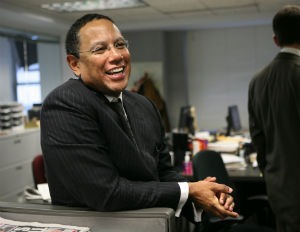 The three are Dean Baquet (pictured), the first African American editor of the New York Times, Fox News analyst Juan Williams and CNN anchor Don Lemon.
The three are Dean Baquet (pictured), the first African American editor of the New York Times, Fox News analyst Juan Williams and CNN anchor Don Lemon.
Lemon is the “dumbest man on television” and Williams is part of “the garbage littered all over” Fox News.
Of Baquet, Trump tweeted Friday, “@deanbaquet is to be seriously respected. He has long been considered one of the dumbest men in the world of journalism, and he became Executive Editor of the Failing New York Times. Not easy to do. He has given up on ‘figuring Trump out’. Called it all wrong from the…
“…beginning, was forced to apologize (Fake News!) after the seriously wrong call of the 2016 Election, and is now willing to write anything, even if not truthful. He laughs at his boss, Publisher A.G. Sulzberger, and I laugh at them all. The @nytimes is a total mess!”
Baquet declined comment.
- David Bauder, Associated Press: Reporters Alcindor, Collins, Jiang get under Trump’s skin
- Jonathan Capehart, Washington Post: Come on. Biden’s ‘you ain’t black’ comment was clearly a joke.
- Jonathan Capehart, Washington Post: Biden has four great options for a black female running mate. One is his best.
- Annie Linskey and Sean Sullivan, Washington Post: Klobuchar, amid Biden VP search, scrambles to fix relations with black community
- Ruben Navarrette Jr., Washington Post Writers Group: I’ll let you in on a little secret: Latinos don’t like Biden
- Michele L. Norris, Washington Post: Joe Biden’s hill just got steeper. That’s a good thing.
- Jamil Smith, Rolling Stone: Joe Biden Got Too Comfortable
- Hanna Trudo, Daily Beast: ‘Wise Guy’ Biden Apologizes for ‘You Ain’t Black’ Gaffe
“Less than two weeks before the Feb. 23 incident that left Ahmaud Arbery fatally shot in a suburb outside Brunswick, the father and son charged in the case had a confrontation with a young black man who had entered a neighboring house under construction, according to a neighbor who helped in the search,” Brad Schrade and Bert Roughton Jr. reported May 12 for the Atlanta Journal-Constitution. (Credit: Footage provided to the Atlanta Journal-Constitution)
Objection to Phrase ‘Unarmed Black Man’
“When journalists write or broadcast these words — ‘unarmed black man’— what do you hear? It’s a phrase that has become pervasive in the American news media, including on NPR’s airwaves and in its digital news stories,” Kelly McBride, NPR ombudsman, wrote on Thursday.
The most recent example is in reporting the shooting of Ahmaud Arbery in Glynn County, Ga.
“Since a string of deaths of young black men at the hands of police gave rise to the Black Lives Matter movement, the phrase has become journalistic shorthand for this message: white people unjustly shooting a black man, because their racial prejudice led them to assume he was a threat,” McBride said.
“That’s a lot of work for three words. . . .”
McBride also wrote, “Indeed the entire story of unjustified violence by white people against black people is rooted in more than whether the black man did or didn’t have a gun. Had Arbery been shot in the back while jogging by two men who assumed because he was black he was a fleeing burglar, and a gun was found in his pocket, would that make it more justifiable?
“The core narrative doesn’t make sense unless you are familiar with and accept the premise that rooted deep in the collective American psyche is more than armed or unarmed: It’s about a false assumption that black people are more likely to be criminals. . . .”
- Quintez Brown, Courier Journal, Louisville, Ky.: White power is America’s endless pandemic. Without a cure, more people will die (May 14)
- Russ Bynum and Aaron Morrison, Associated Press: Ahmaud Arbery case puts spotlight on community’s race legacy (May 13)
- Darcy Costello and Tessa Duvall, Courier Journal, Louisville, Ky.: FBI opens independent investigation into fatal police shooting of Breonna Taylor
- Virginia Cumberbatch, Austin American-Statesman: Will You Run? A message for white Austin
- Editorial, Charlotte (N.C.) Observer: NC demonstrators wielded guns and terrorized a family. Where were the police? (May 14)
- Roy S. Johnson, al.com: Could the Ahmaud Arbery tragedy happen in Alabama?
- Rick Rojas and John Eligon, New York Times: In Ahmaud Arbery’s Hometown, Pain, Anger and Pride in a Shared Racial History (May 10, updated May 20)
- Kurt Streeter, New York Times: Running While Black: Our Readers Respond
- Cleve R. Wootson Jr. and Michael Brice-Saddler, Washington Post: ‘This was supposed to go away’: The battle to shape how the world viewed Ahmaud Arbery’s killing
Producers Made Madam Walker Story Cringeworthy
“For more than three years, I’d been part of a complex and frustrating dance as my nonfiction, fact-based material was translated from book to movie by scriptwriters whose visions, goals and sensibilities often were quite different from mine,” A’Lelia Bundles wrote May 12 for The Undefeated.
Bundles’ 2001 biography of Madam C.J. Walker, “On Her Own Ground,” was loosely translated into the hit Netflix series, “Self Made: Inspired by the Life of Madam C.J. Walker.”
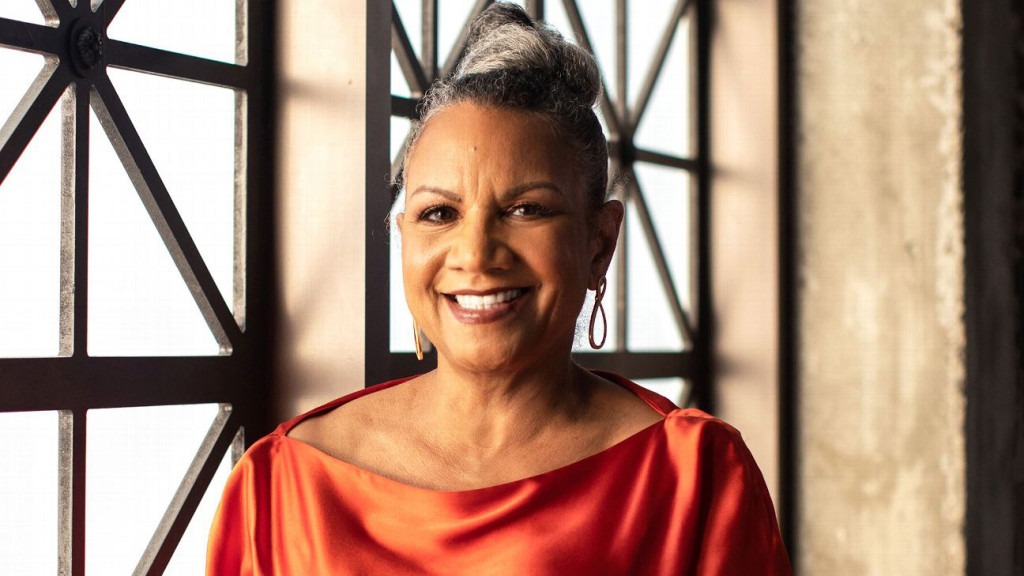 Bundles (pictured), a former director of talent development at ABC News, also wrote, “The internet shade was serious and some of it targeted me. Why, someone asked in a YouTube comment thread, had ‘the great-great-granddaughter allowed this?’ All I could think was: If this person only knew how hard I’d argued against that story line.
Bundles (pictured), a former director of talent development at ABC News, also wrote, “The internet shade was serious and some of it targeted me. Why, someone asked in a YouTube comment thread, had ‘the great-great-granddaughter allowed this?’ All I could think was: If this person only knew how hard I’d argued against that story line.
“Viewers familiar with the contemporary racial politics of Black Lives Matter wished for more details about how Walker had thrived at a time when black communities were terrorized by lynchings. Instead, they got a fantasy boxing match between two black businesswomen, a heavy dose of concocted colorism and relatively little about Walker’s philanthropy and political activism. . . .
“When I finally received the script for episode one in the spring of 2019, I was beyond shocked. What I hoped would impress me instead made me cringe. It also broke my heart. I had been anticipating Hidden Figures. Instead The Real Housewives of Atlanta was staring back at me from the page. . . .
“I have no quarrel with the need to create compelling entertainment. Hollywood executives have every right to expect a return on their financial investment. But because our stories have been erased and marginalized for so long, I do not think it’s too much to ask that the clichés be counterbalanced with some authenticity, especially with a life that defies the stereotypes and needs little embellishment. . . .
“With so many significant aspects of Walker’s life still to be told, there is room for a do-over. . . .”
Rana Cash Named Editor of Savannah Morning News
 “Veteran journalist Rana Cash (pictured) will lead news gathering for the Savannah Morning News as the publication’s news director, parent company Gannett announced Tuesday,” the Georgia newspaper reported.
“Veteran journalist Rana Cash (pictured) will lead news gathering for the Savannah Morning News as the publication’s news director, parent company Gannett announced Tuesday,” the Georgia newspaper reported.
“Cash will also serve as executive editor for the USA TODAY Network’s two other Georgia news organizations, the Augusta Chronicle and Athens Banner-Herald, and coordinate statewide news coverage among the three newspapers and their websites.
“ ‘I look forward to sharing the stories of Georgians and making an impact in our communities,’ Cash said. ‘We want to meet readers where they are and provide coverage that is timely, relevant and interesting every single day.’
“Cash will become the first African American to lead the Savannah newsroom in the publication’s 170-year history. The Savannah Morning News has had African-Americans in other editor roles in recent decades but never as the newsroom leader.
“She comes to her new position from the Louisville Courier Journal, a Gannett publication in Kentucky where she’s served as sport director since 2018. . . .”
Michael Carr Promoted to GM in Fresno
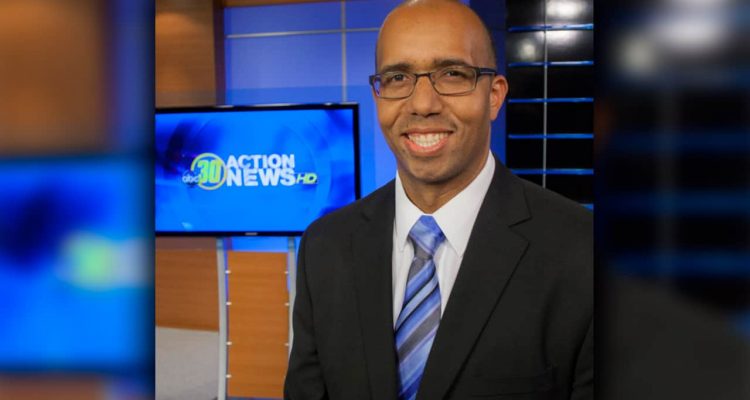 “ABC Owned Television Stations today promoted Michael Carr (pictured) to president and general manager of its KFSN Fresno, Calif. (DMA 55),” Mark K. Miller reported Monday for TVNewsCheck. “In his new role, Carr has overall management responsibility for KFSN and its ancillary businesses.
“ABC Owned Television Stations today promoted Michael Carr (pictured) to president and general manager of its KFSN Fresno, Calif. (DMA 55),” Mark K. Miller reported Monday for TVNewsCheck. “In his new role, Carr has overall management responsibility for KFSN and its ancillary businesses.
“Wendy McMahon, president, ABC Owned Television Stations, said: ‘Michael started his career at KFSN decades ago and has repeatedly proven his incredible dedication to the station and the community. During his tenure as news director, he led the newsroom to embrace innovation and next-generation storytelling while always ensuring a steadfast commitment to our mission as local news brands.
” ‘That vision and leadership led to increased ratings, audience reach and total engagement. . . .’ “
Just 2.3 percent of local television general managers at non-Spanish-language stations are African American, according to the annual survey by the Radio Television Digital News Association.
Passings
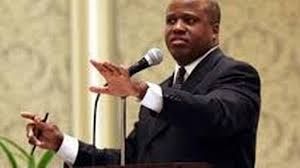 “Roger B. Brown (pictured), a former sportswriter for the Fort Worth Star-Telegram and the host of a popular sports radio talk show on KKDA-AM for more than two decades, died earlier this week after suffering a stroke,” David Moore reported Wednesday for the Dallas Morning News. “He was 61.
“Roger B. Brown (pictured), a former sportswriter for the Fort Worth Star-Telegram and the host of a popular sports radio talk show on KKDA-AM for more than two decades, died earlier this week after suffering a stroke,” David Moore reported Wednesday for the Dallas Morning News. “He was 61.
“Brown became the Star-Telegram’s first full-time black sportswriter when he joined the paper in 1987. He spent 15 years at the paper, during which he covered high schools and the Dallas Mavericks.
“His profile grew when he landed a show on KKDA. ‘Talking Sports With Roger B. Brown’ first hit the airwaves in 1990 and was heard from 6 to 7 p.m. weekdays. A Sunday edition was eventually added and ran from 6-8 p.m. weekly. . . .”
A memorial service was streamed Saturday.
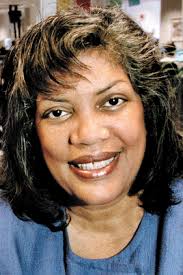 Cheryl G. Butler (pictured), who worked in newsrooms for 36 years before retiring in 2004, died Thursday in a Lewes, Del., hospital after suffering a stroke on Tuesday, her stepdaughter, Nita Worley, told Journal-isms on Saturday. The Omaha, Neb., native turned 75 on Jan. 13. “Her most recent position was with the Washington Post, where she held various positions in copy editing and news editing/page design. Butler spent her last four years at the Post as director of recruiting and hiring for the newsroom,” according to a short bio from the University of Nebraska – Lincoln.
Cheryl G. Butler (pictured), who worked in newsrooms for 36 years before retiring in 2004, died Thursday in a Lewes, Del., hospital after suffering a stroke on Tuesday, her stepdaughter, Nita Worley, told Journal-isms on Saturday. The Omaha, Neb., native turned 75 on Jan. 13. “Her most recent position was with the Washington Post, where she held various positions in copy editing and news editing/page design. Butler spent her last four years at the Post as director of recruiting and hiring for the newsroom,” according to a short bio from the University of Nebraska – Lincoln.
The bio also said, “After graduating with a degree in news-editorial journalism from the University of Nebraska in 1968, she worked four years on the copy desk at the Lincoln Evening Journal. Butler left for the St. Paul (Minn.) Dispatch, where she was a copy editor, assistant news editor and layout editor from 1972 to 1981. Her interest in the development of young journalists, particularly in minority representation in the news business, led Butler to teach several summers in the editing program for minority journalists of the Maynard Institute for Journalism Education. . . .” Services are incomplete.
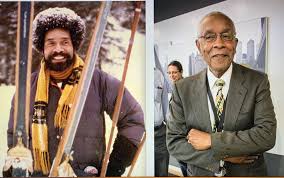 “In yet another sign that this is the end of an era, Chicago newspapering lost a link to its marvelous past last week with the passing of Albert Dickens (pictured) at 82,” Herb Gould wrote Tuesday for Sports Illustrated.
“In yet another sign that this is the end of an era, Chicago newspapering lost a link to its marvelous past last week with the passing of Albert Dickens (pictured) at 82,” Herb Gould wrote Tuesday for Sports Illustrated.
“Officially, Albert was an editorial assistant in the sports department at the Sun-Times and its sister paper, the Daily News, for 49-plus years.
“The truth, though, is that Albert was the straw that stirred the drink. The executive officer, the glue guy. For all of us who were on the road, Albert took care of business. He handled our important phone calls, untangled our all-important expense accounts, checked in our stories. Took care of credentials, packages, you name it. . . .”
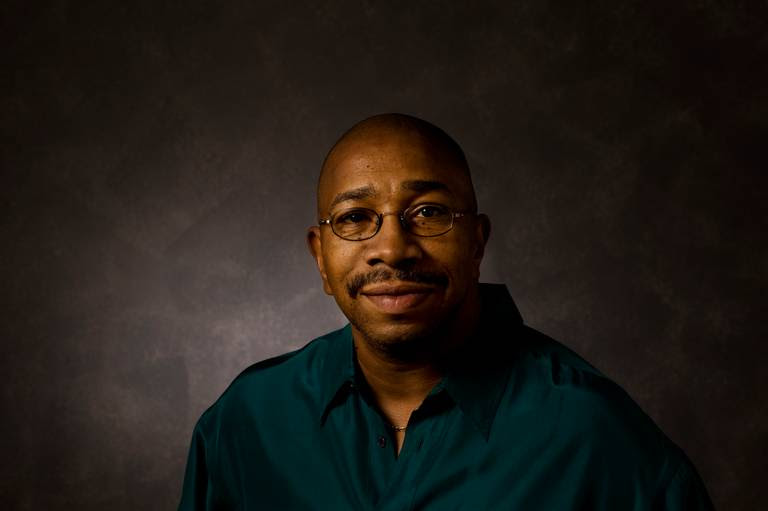 “Marty McNeal (pictured) has passed away? Those words just don’t seem plausible because anyone who knew the former Kings beat writer for The Sacramento Bee would agree that Martin McNeal was timeless,” Marcus Breton wrote Thursday, updated Friday, for the Sacramento Bee.
“Marty McNeal (pictured) has passed away? Those words just don’t seem plausible because anyone who knew the former Kings beat writer for The Sacramento Bee would agree that Martin McNeal was timeless,” Marcus Breton wrote Thursday, updated Friday, for the Sacramento Bee.
“He was a life force. He was pure New York swagger. He was not tall but had the intellect and bravado to cut NBA players down to size with his hilariously profane style of ‘conversating” that was so funny, you couldn’t get mad at him even when you were his target.
“McNeal died Thursday in a hospital in Dallas, where he and his family had moved recently after nearly 30 years in Sacramento. His wife Beverly and his son Phillip were at his side. McNeal was 64 and had been battling leukemia. . . .”
A fund-raiser has been organized onGoFundMe.
David Aldridge (pictured below), editor in chief at The Athletic D.C., posted the following appreciation on Facebook:
When I first started at the [Washington] Post, I was a terrified 22-year-old.
When I started covering the Bullets and the NBA, I was a slightly less terrified 24-year-old who was terrified of messing up and losing his gig.
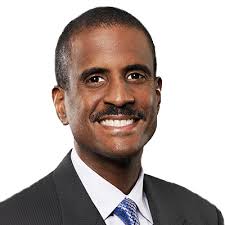 But as I made my way around the league the first few months, a lot of folks reached out. There were Mike Monroe and Steve Bulpett and Bob Ford. But the network of young black reporters like me around the country, young and hungry and all, like me, determined to show that we belonged and could do the work, helped lift me up in ways I can’t repay. Guys like Clifton Brown & David Steele & Curtis Bunn; Barry Cooper & Shaun Powell & Dwain Price & Art Thompson III & Terry Foster. The late Bryan Burwell & Lacy Banks & Drew Sharp. And, Martin P. McNeal in Sacramento.
But as I made my way around the league the first few months, a lot of folks reached out. There were Mike Monroe and Steve Bulpett and Bob Ford. But the network of young black reporters like me around the country, young and hungry and all, like me, determined to show that we belonged and could do the work, helped lift me up in ways I can’t repay. Guys like Clifton Brown & David Steele & Curtis Bunn; Barry Cooper & Shaun Powell & Dwain Price & Art Thompson III & Terry Foster. The late Bryan Burwell & Lacy Banks & Drew Sharp. And, Martin P. McNeal in Sacramento.
Marty Mac. Tone Loc. We all called him Tone Loc. He sounded just like Tone. Marty was just a force, New York through and through, suffering no fools — including, occasionally, those on his staff at the Bee — or on the Kings teams he covered so incredibly well for 20 years. There was nothing like Marty Mac starting a story, with a toothpick in the corner of his mouth, with “this motherfucker…”
Marty always showed me around, took me to the spots, and introduced me to everyone in town. On the road he was often a great dinner companion. But more than that, he was just such a good dude. (And the slowest writer ever. I mean, glacial. We’d be like, “Marty – the spot closes in 45 minutes.” And, as Jason Jones said in another post, Marty would often look up and say, ‘fuck a deadline.’)
We knew Marty was sick, and a bunch of us sent some videos of hope and healing to him, through the good graces of Jerry Bembry. But the last I’d heard about a month ago was that Marty was at home in Dallas and slowly on the mend.
The last time I talked with him, he’d mentioned that he’d heard me thank him in a speech for helping me so much when I first started. And he said, “damn, man, I didn’t expect to hear MY motherfucking name mentioned.”
Yeah, Tone. Your motherfucking name. Thank you. Rest in power, and blessings to you and your family.
Short Takes
- On Thursday, the 163-year-old magazine The Atlantic “announced that it would lay off 68 employees, or 17 percent of its staff, evidence that even the most robust media businesses are vulnerable to the crisis that has ravaged news organizations nationwide,” Marc Tracy reported Thursday for The New York Times. Anna Bross, vice president of communications, did not say which journalists of color were affected, but messaged Journal-isms, “Across the whole of The Atlantic, as well as in the newsroom specifically, the racial, gender, and age diversity of our staff stays relatively unchanged with these staff reductions. (Put another way, the job eliminations did not have a disparate impact.)”
- “The coronavirus has prompted almost two-thirds of American believers of all faiths to feel that God is telling humanity to change how it lives, a new poll finds,” Elana Schor and Hannah Fingerhut reported May 15 for the Associated Press. They also wrote, “black Americans were more likely than those of other racial backgrounds to say they feel the virus is a sign God wants humanity to change, regardless of education, income or gender. Forty-seven percent say they feel that strongly, compared with 37% of Latino and 27% of white Americans. . . .”
- “Miss ‘The Last Dance’ because you don’t have access to cable’s ESPN? ABC plans to air the popular 10-part documentary on Michael Jordan and the Chicago Bulls on free TV over the next five weekends,” Phil Rosenthal reported Tuesday for the Chicago Tribune. ” ‘The Last Dance’ averaged 5.648 million viewers across all 10 episodes when they premiered on Sunday nights the past five weeks — making it the most-watched ESPN documentary of all time,” Ryan Young reported Thursday for Yahoo Sports.
- Columnist Barry Carter, who left the Star-Ledger in Newark, N.J., this month after 31 years there, has joined the Newark Department of Public Safety’s Public Information Office, the department announced on Facebook Tuesday.
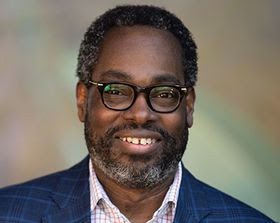 The nonprofit publication “BridgeDetroit will be launching a new community news website headed by Pulitzer Prize-winning journalist Stephen Henderson (pictured),” Mariam Ahmed reported Wednesday for Talking Biz News. “The new venture is backed by $5 million in donations with $2.25 million coming in from the John S. and James L. Knight Foundation. Other donors include the Community Foundation for Southeast Michigan, sponsor Delta Dental of Michigan and the Facebook Journalism Project Community Network program. . . .” In 2017, Henderson was ousted as managing director of opinion and commentary at the Detroit Free Press over harassment allegations that he denied. In 2014, Henderson was the National Association of Black Journalists’ Journalist of the Year.
The nonprofit publication “BridgeDetroit will be launching a new community news website headed by Pulitzer Prize-winning journalist Stephen Henderson (pictured),” Mariam Ahmed reported Wednesday for Talking Biz News. “The new venture is backed by $5 million in donations with $2.25 million coming in from the John S. and James L. Knight Foundation. Other donors include the Community Foundation for Southeast Michigan, sponsor Delta Dental of Michigan and the Facebook Journalism Project Community Network program. . . .” In 2017, Henderson was ousted as managing director of opinion and commentary at the Detroit Free Press over harassment allegations that he denied. In 2014, Henderson was the National Association of Black Journalists’ Journalist of the Year.
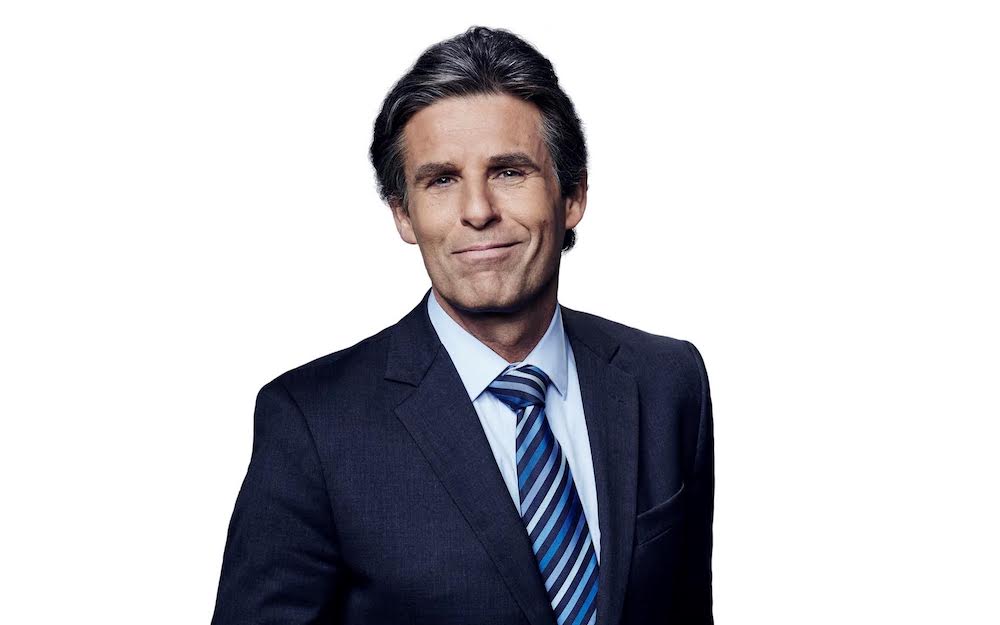 “Former CNN en Español anchor Carlos Montero has found a new TV home with Canal 5 Noticias (C5N),” Veronica Villafañe reported Monday for her “Media Moves” site. “He is now a Miami-based correspondent for the Argentinian cable news channel. Since his departure from CNN, where he worked for 21 years and was one of CNNE’s original anchors, Montero launched his own production company ‘Montero Media.’ . . .”
“Former CNN en Español anchor Carlos Montero has found a new TV home with Canal 5 Noticias (C5N),” Veronica Villafañe reported Monday for her “Media Moves” site. “He is now a Miami-based correspondent for the Argentinian cable news channel. Since his departure from CNN, where he worked for 21 years and was one of CNNE’s original anchors, Montero launched his own production company ‘Montero Media.’ . . .”
- History buffs may be interested in this presentation Sunday at 6 p.m. and 10 p.m. Eastern time on C-SPAN3: “American History TV joined tour guide Eric Finley to learn about the early history of Mobile, Alabama, and to visit Africatown, a National Historic Landmark neighborhood north of the city founded by former slaves who were captives on the ship Clotilda. Recently discovered under the mud of the Mobile River, the Clotilda smuggled approximately 110 kidnapped West Africans to Mobile in 1860. This is part one of a two-part tour.” The program can also be accessed later on c-span.org.
 Eileen Guo (pictured), a Los Angeles-based journalist covering opportunity and inequality, is among five to receive new emergency grants for U.S.-based freelance investigative journalists working on stories about the coronavirus, the Fund for Investigative Journalism announced Wednesday.
Eileen Guo (pictured), a Los Angeles-based journalist covering opportunity and inequality, is among five to receive new emergency grants for U.S.-based freelance investigative journalists working on stories about the coronavirus, the Fund for Investigative Journalism announced Wednesday.
- “This newspaper has never forgotten the 1921 Tulsa Race Massacre — and its fight continues,” reads a headline in the Los Angeles Times over a story by Kurtis Lee Friday about the Oklahoma Eagle. The weekly is a black family-owned newspaper contemplating the 100th anniversary of the massacre that destroyed the Greenwood district, known as “Black Wall Street.” Meanwhile, the Eagle has partnered with the Local Media Foundation, and more than 250 U.S. media outlets from Alaska to Florida in a COVID-19 #covid project.
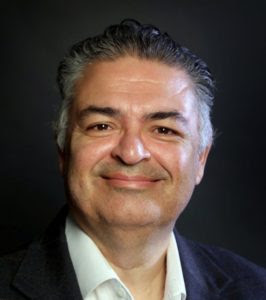 Sergio Bustos (pictured) and Robert Naylor are among five new corps excellence regional managers hired by Report for America, Sam Kille reported for the organization Wednesday. They join Jason Blakeney, Pam Fine and Teri Hayt. Naylor has been director of career development for the News Division of the Associated Press as a consultant to Report for America’s mentor program. Bustos was most recently deputy opinion editor at the South Florida SunSentinel.
Sergio Bustos (pictured) and Robert Naylor are among five new corps excellence regional managers hired by Report for America, Sam Kille reported for the organization Wednesday. They join Jason Blakeney, Pam Fine and Teri Hayt. Naylor has been director of career development for the News Division of the Associated Press as a consultant to Report for America’s mentor program. Bustos was most recently deputy opinion editor at the South Florida SunSentinel.
- Renaissance Journalism announced Monday the 20 nonprofit community, ethnic and university news organizations that will share in $185,000 to cover the impact of the COVID-19 pandemic in the San Francisco Bay Area.
- The 2020 Katherine Schneider Journalism Award for Excellence in Reporting on Disability contest is now open, the National Center on Disability and Journalism announced. Submissions may be entered here before the due date of August 7, 2020. ” First-place winners in each category will be awarded $2,500 and invited to give a public lecture for the Cronkite School in fall 2020. Second-place winners will receive $1,000, third-place winners $500.”

- In Brazil, journalist “Leonardo Pinheiro was killed while conducting an interview on the afternoon of May 13 in the municipality of Araruama in the state of Rio de Janeiro,” Teresa Mioli reported May 14, updated Wednesday, for the Knight Center for Journalism in the Americas. “The seaside city of 132,000 is 74 miles from the state capital. Pinheiro, who owned the Facebook page A Voz Araruamense and collaborated with the page Fala Araruama, was reporting when a car approached, he was told to kneel and was shot, according to what Fala Araruama posted on its Facebook page. . . .”
- Journalist Jorge Miguel Armenta Ávalos, director of the outlet Medios Obson, was killed in an armed attack in Ciudad Obregón, in the state of Sonora, Mexico, on May 16, according to information published by the state attorney general on Twitter, Marina Estarque reported Monday for the Knight Center for Journalism in the Americas. The journalist was under government protection after receiving death threats, according to the BBC. In addition to Armenta, a police officer was killed and another was injured in the attack, according to information from the attorney general’s office. . . .”
- “Nigerian authorities should cease their intimidation of journalist Saint Mienpamo Onitsha and ensure that security forces permit the press to work freely,” the Committee to Protect Journalists said Tuesday. “At about 1 a.m. on May 9, four masked Department of State Services agents forced their way into the home of Onitsha, the founder of Naija Live TV, an independent news website, in Yenagoa, the capital of Nigeria’s southern Bayelsa state, blindfolded him, and drove him around for more than three hours before bringing him to the department’s local headquarters, according to the journalist, who spoke with CPJ via phone and messaging app, and a report by the privately owned Sahara Reporters newspaper. . . .”
[btnsx id=”5768″]
Facebook users: “Like” “Richard Prince’s Journal-isms” on Facebook.
Follow Richard Prince on Twitter @princeeditor
Richard Prince’s Journal-isms originates from Washington. It began in print before most of us knew what the internet was, and it would like to be referred to as a “column.” Any views expressed in the column are those of the person or organization quoted and not those of any other entity. Send tips, comments and concerns to Richard Prince at journal-isms-owner@yahoogroups.com
View previous columns (after Feb. 13, 2016).
- Diversity’s Greatest Hits, 2018 (Jan. 4, 2019)
- Book Notes: Is Taking a Knee Really All That? (Dec. 20, 2018)
- Book Notes: Challenging ’45’ and Proudly Telling the Story (Dec. 18, 2018)
- Book Notes: Get Down With the Legends! (Dec. 11, 2018)
- Journalist Richard Prince w/Joe Madison (Sirius XM, April 18, 2018) (podcast)
- Richard Prince (journalist) (Wikipedia entry)
- February 2018 Podcast: Richard “Dick” Prince on the need for newsroom diversity (Gabriel Greschler, Student Press Law Center, Feb. 26, 2018)
- Diversity’s Greatest Hits, 2017 — Where Will They Take Us in the Year Ahead?
- Book Notes: Best Sellers, Uncovered Treasures, Overlooked History (Dec. 19, 2017)
- An advocate for diversity in the media is still pressing for representation, (Courtland Milloy, Washington Post, Nov. 28, 2017)
- Morgan Global Journalism Review: Journal-isms Journeys On (Aug. 31, 2017)
- Diversity’s Greatest Hits, 2016
- Book Notes: 16 Writers Dish About ‘Chelle,’ the First Lady
- Book Notes: From Coretta to Barack, and in Search of the Godfather
- Journal-isms’ Richard Prince Wants Your Ideas (FishbowlDC, Feb. 26, 2016)
- “JOURNAL-ISMS” IS LATEST TO BEAR BRUNT OF INDUSTRY’S ECONOMIC WOES (Feb. 19, 2016)
- Richard Prince with Charlayne Hunter-Gault,“PBS NewsHour,” “What stagnant diversity means for America’s newsrooms” (Dec. 15, 2015)
- Book Notes: Journalists Follow Their Passions
- Book Notes: Journalists Who Rocked Their World
- Book Notes: Hands Up! Read This!
- Book Notes: New Cosby Bio Looks Like a Best-Seller
- Journo-diversity advocate turns attention to Ezra Klein project (Erik Wemple, Washington Post, March 5, 2014)
![]()

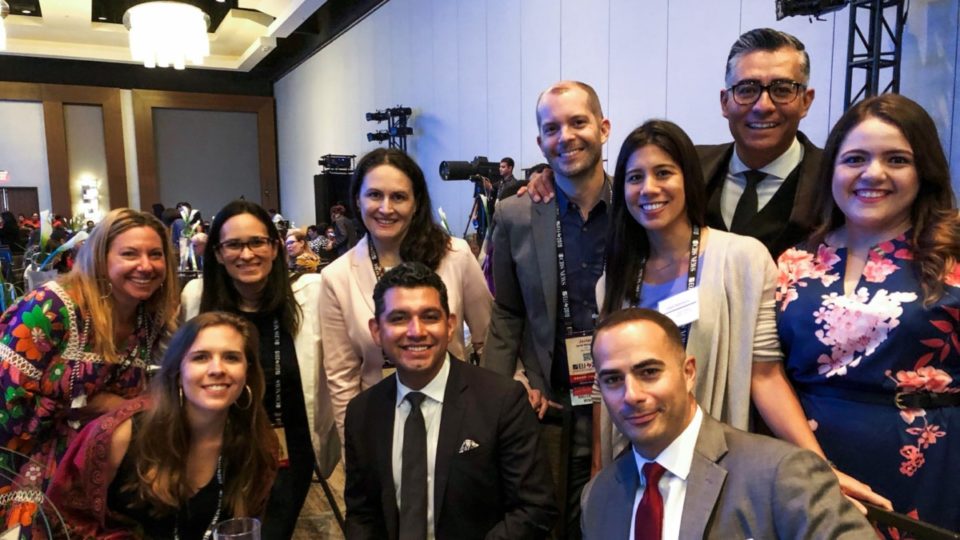
8 comments